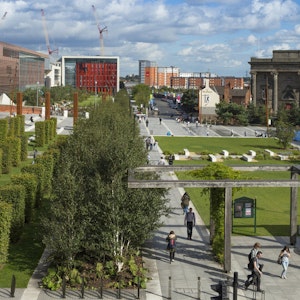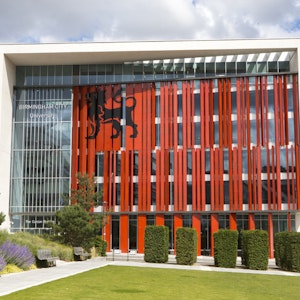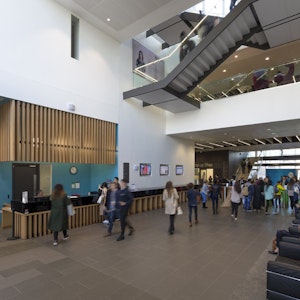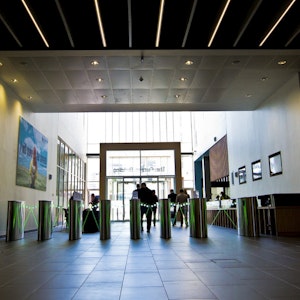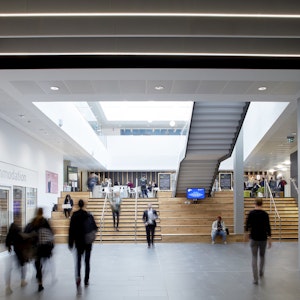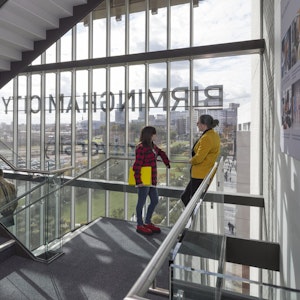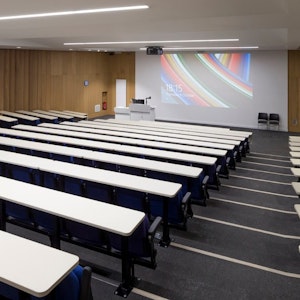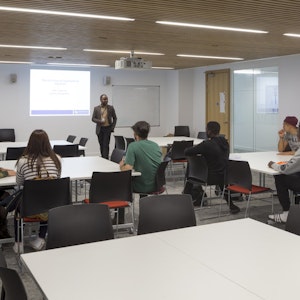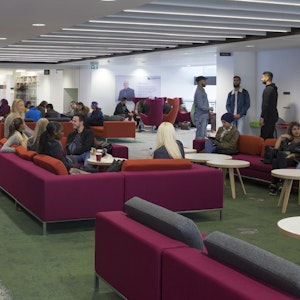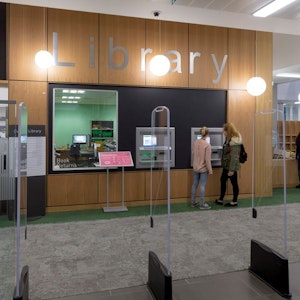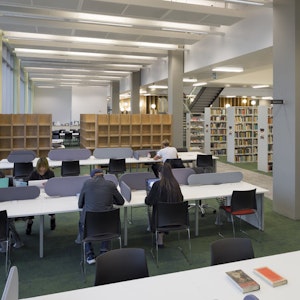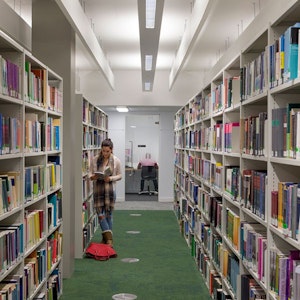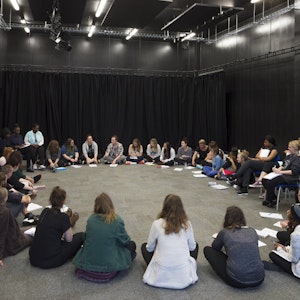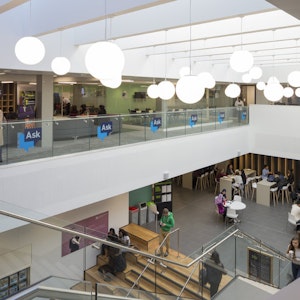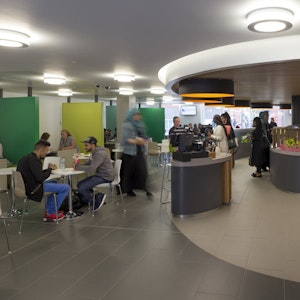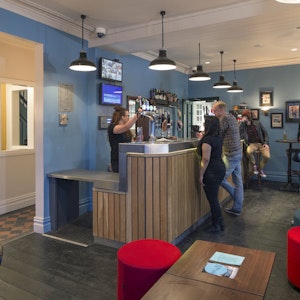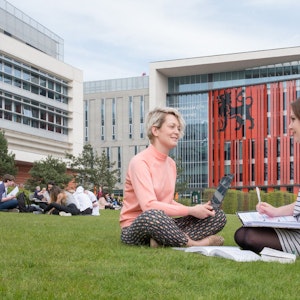
English - BA (Hons)
Currently viewing course to start in 2024/25 Entry.
Our versatile BA (Hons) English course gives you the freedom to choose the subjects that suit you at each stage of your degree. You can combine the literary and the linguistic, the critical and the creative, the historical and the contemporary....
- Level Undergraduate
- Study mode Full Time
- Location City Centre
- Award BA (Hons)
- Start date September 2024
- Fees View course fees
- School School of English
- Faculty Faculty of Arts, Design and Media
This course is:
Available with Professional Placement year
Open to International Students
Overview
[00:00:01] Speaker 1 My name is Tia Cullis and I'm a third year English Literature student. If you're thinking of studying English, BCU is the place for you, and that's why my story starts here. English literature was always the thing I was going to choose to do at uni. At the open day of the talks that we had, the information that we got given really made me understand that this was what I wanted to do. My highlight has probably been the modules that I got to take and how they have really influenced and shaped who I am as a person. I took a module that was about work placements, so I got to go the Black Country Living Museum and from there in that placement, it stemmed this kind of love in me for the marketing and from the it's made me realise that that's what I want to do as a career.
[00:00:46] Speaker 2 I'm Ian Taylor, I'm in my first year of my Creative Writing degree. I sort of went from the rural countryside to Birmingham, just this massive new place. I want to tell stories that make sure that the reader knows that they're allowed to love themselves, even if they feel no one else does. And I think a creative writing degree is just going to help that. I believe in the concept of having your own sort of people, and I think by coming to BCU, I've definitely found that I've met so many people that also like reading, that also like doing the things I like doing. You can't get really much better than that when it comes to making connections.
[00:01:22] Speaker 3 My name is Kseniia Yakutina, I'm doing Foundation Year and I'm studying English and Journalism. Before in Ukraine, I lived in a small town and because Birmingham is big, there's lots to see and do, lots of opportunities, lots of new and interesting people. After the invasion of Russia in 2014, there was a programme they opened to give some opportunities for children and I won a scholarship to come to England. And from there my English journey started. I really wanted to have the skill and know what am I doing, how to write and how to do it professionally. I really liked how the programme is built because they do really relevant modules. They have like literature, linguistics and also some of journalism. And it's, it's super interesting for me.
Our versatile BA (Hons) English course gives you the freedom to choose the subjects that suit you at each stage of your degree. You can combine the literary and the linguistic, the critical and the creative, the historical and the contemporary. You can experience all aspects of English Studies to develop extensive knowledge and skills in different literary periods, approaches to language, and writing practices. The course covers how language, writing and texts work; studies diverse literature authors have created; and teaches you to write cogently and imaginatively. It empowers you to plot your own story as an individual, collaborator, and future professional.
What's covered in this course?
At the heart of our English courses is a shared interest in words and stories, and an appreciation of the real difference they make in the world. Taught by world-leading academics in a friendly, supportive learning community, you will explore the power of language and literature in ways that matter today and to you.
Flexibility and diversity of choice are built into our inclusive course for you to shape your degree according to your interests, strengths, and career goals. You can study and practice a range of forms, genres, and modes of communication from different historical contexts and theoretical perspectives, across literature, language, creative writing, and drama. Our courses include opportunities for work experience or peer collaboration as standard and culminate in a Major Project, which allows you to research and write about ideas and questions of your choosing.
English at BCU is a top-20 research department for English Studies and research excellence is central to our taught courses. We focus on the practice and application of subject knowledge and skills to develop graduate readers, thinkers, and writers that excel in criticality, creativity, and communication. As a perceptive critical thinker, you will interpret and assess complex information and situations to form intelligent judgements and solutions. As a creative individual, you will produce new and imaginative texts, and devise interesting, challenging ideas. And, as a proficient, versatile communicator, you will be trained in clear and accurate spoken and written English to professional standards.
Our graduates are characterised by their extensive knowledge and skills in English, and transferrable qualities that are sought-after by employers. These subject-specific and professional skills and attributes are embedded in the course to open a wide range of career paths and employment opportunities, including (but not limited to) education; writing, editing and publishing; advertising and marketing; public relations; and digital content creation.
Professional Placement Year
This course offers an optional professional placement year. This allows you to spend a whole year with an employer, following successful completion of your second year, and is a great way to find out more about your chosen career. Some students even return to the same employers after completing their studies.
If you choose to pursue a placement year, you will need to find a suitable placement to complement your chosen area of study. You will be able to draw on the University’s extensive network of local, regional, and national employers, and the support of our Careers teams. If you are able to secure a placement, you can request to be transferred to the placement version of the course.
Please note that fees are payable during your placement year, equivalent to 20% of the total full-time course fee for that year.
What I enjoy most about the BA English course is the variety of modules we get to choose from. From writing short stories to studying multicultural literature, I've had the chance to explore texts from many time periods and locations. The assessments provide a brilliant opportunity to express my ideas, while building on my critical thinking skills. My experience with the course has only nurtured my passion for language and literature - and motivates me to pursue it further!
Madina Outama
Why Choose Us?
- Top 10 for English graduate prospects (Complete University Guide 2024).
- You will be taught by world-leading academics and expert practitioners who foster a community of experimentation, innovation and inclusivity, creating an environment in which student learning can flourish. The programme focuses on the development of core knowledge and skills for English study and how they can be translated to foster interdisciplinary, practice-based education.
- Combining the study of literature, language, drama and creative writing, English at Birmingham City University is, by definition, interdisciplinary. The programme offers multiple opportunities for you to collaborate across disciplines in order to gain new perspectives on the relevance of your study in the wider world.
- English is a subject highly-prized by employers for the range of transferable skills it develops. Equipped with a strong subject knowledge, you will develop an ability to work as an independent researcher, to communicate effectively in spoken and written discourse, to critically evaluate the work of others, and to respond imaginatively to original briefs, initiate, manage and complete research projects, either independently or as a group. You will be able to apply these skills through work placement opportunities or collaborative practice with others in your year group to ensure you can articulate and demonstrate a sound knowledge and skill-base to future employers.
- English is a global language; its culture has an international reach. Understanding the effects of this and how English has been shaped and reshaped by its engagement with the world at large is a key principle of the programme. You not only have the opportunity to contextualise English in this way as part of the taught programme, but can also apply to undertake part of your studies abroad at one of our exchange partner universities.
- Our teaching staff are also expert researchers in English Language and Literature. 94% of research in English at BCU was judged to be either world-leading (4*) or internationally excellent (3*) in REF2021.
Open Days
Join us for an on-campus Open Day where you'll be able to meet us in person. Booking for the next event isn’t open yet. Register your interest below and we’ll email you as soon as booking goes live.
Next Open Day: 29 June 2024
Entry Requirements
These entry requirements apply for entry in 2024/25.
All required qualifications/grades must have been achieved and evidenced at the earliest opportunity after accepting an offer to help confirm admission and allow for on-time enrolment. This can also include other requirements, like a fee status form and relevant documents. Applicants can track their application and outstanding information requests through their BCU mySRS account.
Essential requirements
112 UCAS tariff points
Please note: If you qualify for our BCU Accelerate scheme, you could receive an offer that is two grades below our normal entry requirements. Find out more about BCU Accelerate.
If you have a qualification that is not listed, please contact us.
Don’t meet our entry requirements?
You could apply for a foundation course or a course at our International College. These routes have lower entry requirements and act as the bridge to a full degree. To find out more, please select your status:
Fees & How to Apply
UK students
Annual and modular tuition fees shown are applicable to the first year of study. The University reserves the right to increase fees for subsequent years of study in line with increases in inflation (capped at 5%) or to reflect changes in Government funding policies or changes agreed by Parliament. View fees for continuing students.
Award: BA (Hons)
Starting: Sep 2024
- Mode
- Duration
- Fees
- Full Time
- 3 years
- £9,250 in 2024/25
- Apply via UCAS
International students
Annual and modular tuition fees shown are applicable to the first year of study. The University reserves the right to increase fees for subsequent years of study in line with increases in inflation (capped at 5%) or to reflect changes in Government funding policies or changes agreed by Parliament. View fees for continuing students.
Award: BA (Hons)
Starting: Sep 2024
- Mode
- Duration
- Fees
- Full Time
- 3 years
- £16,085 in 2024/25
Guidance for UK students
UK students applying for most undergraduate degree courses in the UK will need to apply through UCAS.
The Universities and Colleges Admissions Service (UCAS) is a UK organisation responsible for managing applications to university and college.
Applying through UCAS
- Register with UCAS
- Login to UCAS and complete your details
- Select your course and write a personal statement
- Get a reference
- Pay your application fee and submit your application
Guidance for International students
There are three ways to apply:
1) Direct to the University
You will need to complete our International Application Form and Equal Opportunities Form, and submit them together with scan copies of your original academic transcripts and certificates.
2) Through a country representative
Our in-country representatives can help you make your application and apply for a visa. They can also offer advice on travel, living in the UK and studying abroad.
3) Through UCAS
If you are applying for an undergraduate degree or a Higher National Diploma (HND), you can apply through the UK’s Universities and Colleges Admissions Service (UCAS).
You can request a printed form from your school or nearest British Council office. You will be charged for applying through UCAS. Birmingham City University’s UCAS code is B25 BCITY.
Personal statement
UK / EU students are required to submit a personal statement as part of their application for this course.*
The personal statement gives you a crucial opportunity to say why you’re applying and why the institution should accept you.
Here are the key areas you’ll need to address:
- Course choice - Why does this course appeal? What areas are of particular interest?
- Career plans - If you have a specific career in mind, say how your chosen course will help you pursue this goal.
- Work experience - Mention any work that is relevant to your subject, highlighting the skills and experience gained.
- School or college experience - Highlight skills gained at school/college, eg summer schools or mentoring activities.
- Non-accredited skills or achievement - eg Duke of Edinburgh Award, Young Enterprise scheme.
You should also mention your future plans – if you’re planning to take a year out, don't forget to give your reasons. Talk about any subjects you’re studying that don’t have a formal assessment and any sponsorships or placements you’ve applied for. And don't be scared to add in details about your social, sports or leisure interests.
Worried about Personal Statements?
If you've got no idea where to start or just want to check you're on the right track, we’ve got expert advice and real examples from our students to help you nail your personal statement. You can even download our ultimate personal statement guide for free.
*Non-EU students are not required to submit a personal statement when applying for this course.

Financial Support
We offer further information on possible undergraduate financial support. This includes the type of loans, grants and scholarships available both from the government and from Birmingham City University.
Course in Depth
First Year
In order to complete this course you must successfully complete all the following CORE modules (totalling 80 credits):
In this module you will explore Birmingham’s status as a diverse and multicultural city. Through probing different notions of ‘multiculturalism’, ‘diversity’ and ‘community’, you will consider the multitude of voices that form the city, their connections, and your positioning in relation to them. As you learn about various aspects of Birmingham’s histories and communities, you will be introduced to key skills and knowledge required for degree-level studies in English and consider their value to your professional development. You will learn how to read and interpret a variety of texts, select appropriate research material and sources, communicate effectively, and work collaboratively. By the end of this module, you will have developed a clear sense of your responsibilities as an English student and acquired the skills necessary to express your own critical and creative voices.
This module adopts complementary perspectives on the transformation and re-creation of texts. The first half of the module concentrates on close readings of translations drawn from epic, sacred and profane traditions to develop skills of literary analysis, differentiation, contextualization and evaluation, while providing the basis for students’ own creative work. Case studies based on stage and film treatments broaden the scope to consider formal and cultural questions relating to adaptation. The second half of the module concentrates on linguistic approaches to the analysis of literary texts (also called Stylistics). Here, the module concentrates on the use of stylistic devices in poems, plays, and prose; and considers how linguistics can highlight techniques used in literary writing to create important literary effects. There will be a specific focus in this half of the module on grammar and style, speech and thought presentation, point of view, and pragmatics.
This module considers how we read and write prose. You will be equipped with key literary analytical tools, including key terms and theories, which you will utilize in your analyses of prose works of different kinds, including prose essays, short stories, and a Booker Prize-winning novel. You will also discuss and practice your own prose writing techniques and have the opportunity to write creative prose of different kinds. You will develop an understanding of the forms and conventions of narrative prose, discursive styles, identify different types of prose, and differentiate between a range of disciplinary perspectives.
‘Key Critical Concepts’ focuses on understanding and applying useful theoretical ideas and analytical approaches to develop your close reading, interpretation, and analysis of literature. It will help you to critically reflect on how language and literature function; on what we bring to a text when we read it; and how to pay careful attention to form, style, and genre. The module promotes more sophisticated readings of a variety of literary texts, including poems, plays, short stories, and extracts from novels, ranging from the early modern period to the present day. By the end of the module, you will have developed foundational knowledge of key critical concepts that you will be able to employ in textual analyses throughout your degree.
In order to complete this course a student must successfully complete at least 40 credits from the following indicative list of OPTIONAL modules:
In this module, you will explore the concept of conflict in literature, from war and revolution to social class, gender, and race, as well as at a psychological level. Through a range of genres and periods, ‘Literature and Conflict’ seeks to engage you with a focused analysis of poetry, drama, the novella and the novel as specific forms and to equip you with the scholarly tools used to investigate them. Conflict creates dramatic interest in narrative, but many forms of criticism assume that conflict should ideally be resolved. We will query this and consider how more overtly ideological criticism might explore the contradictions within a text and disclose what the text itself cannot say. This may lead to the questioning of conflict, resolution and how a historical understanding of conflict is important in our contemporary world.
This module will introduce you to a range of topics in language studies, including phonetics, sociolinguistics, corpus linguistics, and media linguistics. You will expand your knowledge of linguistic concepts and terminology and learn how to apply this knowledge to the analysis of real-life examples of spoken and written language in use. You will be introduced to the phonetic and discourse-level characteristics of English and you will analyse these phenomena in context. The module will help you develop your skills in critical thinking, in analysing different forms of data, in identifying and synthesising information from a variety of sources, and in presenting your findings in a coherent and well-organised way.
In this module, you will explore key elements of effective creative writing and the techniques used to create and control form and style, such as showing and telling, imagery, viewpoint, and narrative. You will examine each element or technique in a given text and then apply what you have learned in your own writing. Textual examples are drawn from a range of forms, such as audio drama, screenplay, poetry, monologue, the novel, short story, stage play and memoir. Each week will inform a different element of your writing technique, feeding into new pieces of writing to be submitted for assessment in a portfolio at the end of the semester. You will also write your own personal Writer’s Manifesto which sets out the intentions behind your writing and your thoughts about the social purpose of writing in your life and the wider world. In preparation for this you will study a range of manifestos written by writers and creative thinkers.
Core modules are guaranteed to run. Optional modules will vary from year to year and the published list is indicative only.
Second Year
In order to complete this course you must successfully complete the following CORE module (totalling 20 credits):
This module examines different forms of writing that engage critically and creatively with key issues
connected to ‘natural’ and ‘man-made’ environments. Each week, we will study a different literary
text, period and genre informed by appropriate theories and scholarship. We will consider how
writing constructs, examines and challenges ideas about nature, life in cities, technology, and
animals, and in doing so engages in debates about equality, sustainability, identity and otherness.
Through a chronological approach to texts from the eighteenth century to the present day, these
topics will be explored in a variety of historical, social, political, and aesthetic contexts. This module
will enhance your understanding of reading and writing as practices through which we develop
knowledge about the world, and the place of people within it. It will prompt you to consider the
importance of the environment and sustainability in relation to employability skills and future careers.
In order to complete this course a student must successfully complete 20 credits from the following indicative list of CORE Faculty modules.
The purpose of this module is to enable you to develop professional attributes and subject skills through experience in the work place, and to critically reflect upon your learning in that context. You will normally be expected to arrange your own placement, with support from academic staff and ADM Careers+.
The module is an opportunity to learn and critically reflect on the skills of collaboration by enabling you to create an interdisciplinary project with students from complementary disciplines, or with academic staff. Collaboration is a vital employability skill within the Creative Industries and this module allows you to develop these skills, making use of University facilities and with the support of academic staff. Within this module framework, several kinds of collaborative opportunities are available. For example, with the approval of your supervisor, you can determine a project based on your own interests; your supervisor may set you a predetermined project to enable you to work with other students in a way that is appropriate to your subject area; or there may be opportunities for you to collaborate with staff on research projects. In all cases, you must apply your subject skills to an interdisciplinary project which will be agreed in advance with your supervisor.
In order to complete this course a student must successfully complete at least 80 credits from the following indicative list of OPTIONAL modules.
This module introduces you to some of the principal works of one of the most dynamic and exhilarating periods in English literature, the cultural legacy of which has influenced the creative arts and the history of ideas ever since. The texts studied on this module raise profound and lasting questions, and you should approach them in a spirit of adventure and enquiry. Can literature act as an agent of revolution? What is the creative imagination? What is liberty? How should we conceive of the natural world? What is the significance of feeling and empathy? What is the relationship between language, society and authority? What do we mean by ‘Romanticism’? Of what is humankind capable? As such, the module also requires you to think about the relationship between literature and history, and how literary texts in any era respond both to the present and the past. Authors and their works are examined in their social, political and economic context, as well as the intellectual, religious and spiritual traditions in which they participate.
This module will deepen your knowledge and understanding of the core foundations of the English language and allow you to research intellectually challenging concepts using a variety of methodological approaches. You will focus on the description of English grammar, morphology, syntax and style as well as analyse linguistics phenomena in context. You will develop your analytical skills and capacity to be reflective and critical when synthesising complex information. The module will build your linguistic skills and thus promote graduate employability.
In this module, you will explore key elements of writing short stories and the distinctive ways they are used. You will discover themes, ideas, and approaches that are appropriate for use within a shorter form, and learn techniques used to create and control style and effect in this context. You will develop your skills learnt in year one, such as showing and telling, the use of detail and description, imagery, viewpoint and narrative structure. Your reading will take in both collections of short stories by a single writer and individual stories by a wider range of contemporary and classic writers. You will examine each element of style in a given short story and then expand and experiment with what you have learned in your own writing. You will write flash fiction and micro fiction as well as more traditional length short stories.
This module covers the poetry and prose of the Victorian period, through which you will learn about the formal properties and trends of literature of the period and the innovations which arose, as well as the historical context including social change, gender roles and religion. You will be encouraged to read widely, and to look backwards and forwards through literary history to enable you to situate the literature of the period in context. There will be a strong emphasis on the close reading of texts and on the importance of research and reading relevant works of criticism; you will be encouraged to develop your research and writing skills and to work independently, which will support your work across this and other modules. We'll also think about Victorian culture and how this remains an important determining factor within modern society.
This module will introduce you the study of language and society and outline how language can vary based on a range of social factors. Over the course of the module, students will explore key concepts and terminology, as well as a range of topics such as language variation and change, language and social class, language and gender, language and race/ethnicity, language contact and bilingualism, language and education, language and the media, research methods in sociolinguistics, the role of language in wider contemporary society, and how sociolinguistic research can be utilised in non- academic contexts.
This module will teach you the essential skills of, and principles behind, the writing of films. While we will focus on short films, many of the principles we learn apply to screenwriting for film and television more generally. You will study a number of freely available short guides to screenplay layout and formatting and be trained in the practical application of screenplay formatting software. You will write several short scripts, given as fortnightly writing exercises, and receive detailed formative feedback on one of the scripts, which you can use to improve and develop your work for your final portfolio. You will focus on visual storytelling, layout conventions, and the issue of writing to scale (budget). You will also be encouraged to analyse, but also critique, dramatic construction in terms of character function, motivation and genre.
This module explores two concepts central to our understanding of what makes us ‘modern’: gender and sexuality. We will challenge ‘common sense’ understandings of gender and sexuality by interrogating cultural identities, such as queer, heterosexual, homosexual, gay, lesbian, straight and trans. It will introduce you to gender studies and sexuality studies as theoretical, social, cultural, political and historical fields of investigation.
‘Multicultural Literature’ focuses on the history of British multiculturalism in literature from the 1950s up to the present day. Exploring a range of British Caribbean, Asian, African, and other multicultural writing, we explore powerful stories of new beginnings, the search for belonging, diverse identities, and complex communities. You will develop a critical awareness of how writers deal with questions of race and nationhood, colonial discourse, cultural hybridity, migration and asylum. The module develops your aesthetic, critical, and historical awareness that will inform your independent thinking about contemporary multiculturalism. It spans a diverse set of literary texts (novels, short prose, poems) produced primarily by ‘minority’ writers in Britain since the post-war era (Caribbean, Asian, African and other less established immigrant groups). You will study these texts alongside relevant histories of migration, theories of representation, and critical debates about multiculturalism.
This module offers a survey of key 20th and 21st century texts and movements in western theatre. You will engage with the artistic movements that developed in Europe from the early 20th century and identify key playwrights and practitioners that brought significant changes to the stage, both on the continent and in Britain. Through studying a range of plays from this period, both as written texts and in performance, you will consider the ways in which innovations in the early 20th century continue to influence theatre writing and practice today.
Digital Storytelling techniques have evolved to include everything from film techniques, still images, immersive-audio, environmental storytelling, and more. In this module we will consider the different ways in which these techniques can be effectively utilised to allow creative citizens to share their stories and to create engaging and meaningful stories through digital platforms. Looking at both factual and fictional storytelling, we will consider case studies that draw on a range of different mediums. We will analyse and discover what makes a compelling narrative, and how alternative sequencing can be utilised. This may involve aspects such as interactive consequential story branching (choose your own adventure), site-specific storytelling, spatial storytelling, and sonic affectivity in digital applications or environments. You will be introduced to a variety of techniques to establish your knowledge of the components of digital storytelling and enhance your understanding. For your assessment you will be required to produce a digital story and compare how this piece sits within the broader field of digital storytelling.
The ability to create compelling content is an essential communication skill and the key to employability in a range of media careers, not least in Public Relations. As well as being engaging and accessible, effective communication almost always involves the ability to produce professional content across a range of platforms and channels. This module concentrates on developing the writing and crafting skills that are highly valued by media employers.
Core modules are guaranteed to run. Optional modules will vary from year to year and the published list is indicative only.
Professional Placement Year (optional)
In order to qualify for the Professional Placement Year, a student must successfully complete the following Level 5 module:
This module is designed to provide you with the opportunity to undertake a credit bearing, 40- week Professional Placement as an integral part of your Undergraduate Degree. The purpose of the Professional Placement is to improve your employability skills which will, through the placement experience, allow you to evidence your professional skills, attitudes and behaviours at the point of entry to the postgraduate job market. Furthermore, by completing the Professional Placement, you will be able to develop and enhance your understanding of the professional work environment, relevant to your chosen field of study, and reflect critically on your own professional skills development within the workplace.
Final Year
In order to complete this course a student must successfully complete all the following CORE modules (totalling 60 credits):
The ‘Major Project Preparation’ module focuses on creative thinking and initial research to develop a proposal and plan for the delivery of your Major Project. You will be introduced to the skills, techniques and processes required to identify, articulate, and organise a project that can be successfully realised. It aims to ensure that you judge the appropriateness of a variety of critical and analytical approaches to developing a major project and that you create a plan that is within scope and can be delivered successfully to a high standard.
The Major Project: Dissertation module is where you will put into practice the creative thinking, initial research, proposal, and plan developed in the Major Project Preparation module and wherein you will undertake a sustained, in-depth and theoretically informed research project exploring an area that is of personal interest to you and which represents the culmination of your studies.
In order to complete this course a student must successfully complete at least 60 credits from the following indicative list of OPTIONAL modules.
In this module we focus on modernism – the defining artistic movement of the twentieth century – to analyse a range of literary texts that we hope you will find challenging and rewarding. Together, we explore what literary modernism was but we also consider an active claim: that literary modernism continues to influence post-war and contemporary authors and that, in various ways, it persists well into late twentieth century and twenty-first century literature. We cover central modernist writers who are considered key formal innovators, such as Joseph Conrad, Ezra Pound, Virginia Woolf, and D. H. Lawrence. We then explore how later writers, such as Samuel Beckett, Jean Rhys, Muriel Spark, J. M. Coetzee, and Zadie Smith, handle the legacies of the modernist movement. You will be encouraged to engage closely with issues of form and style in significant modernist and postmodern texts. At the same time, we will situate these texts in their historical contexts, considering key themes and categories such as tradition, colonialism, industrialisation, culture, gender, time, and ethics.
This module will introduce you to the field of Applied Sociolinguistics and how sociolinguistic research can contribute to improving human well-being. You will learn to critically evaluate the role of sociolinguistics in addressing linguistic and social inequalities and how language shapes all aspects of social life. You will work with an external partner and investigate the application of sociolinguistic research to the solution of practical, educational and social problems of all types. You will learn how evidence-led sociolinguistic research can be applied in a variety of settings, including healthcare, law, tourism, the workplace, and other non-academic contexts. The module will develop your skills in leveraging sociolinguistic research to produce demonstrable changes in practice and teach you to how to engage a variety of external stakeholders and end-users in your research.
This module will enable you to build upon your current reading and writing of poetry, and to develop your range, technique and sophistication as a contemporary poet and thinker on poetry. As well as cultivating your ability to read poetry sympathetically and critically, you will learn how to nurture the poetic imagination and what Ted Hughes called its ‘psychic disciplines’, with a view to strengthening and emboldening the intuition and sensitivity upon which poetic technique depends. You also will acquire practical knowledge of publishing and performing your own work.
This module focuses on literature in the gothic tradition from its inception through to the present day. During the module, the development of the gothic form will be traced from its origins through to recent manifestations of the genre. Gothic literature often reflects social and cultural trends as well as providing a space to manifest cultural anxieties, expressing a society’s suppressed desires and fears in an acceptable literary form. Such texts can therefore be read not only as escapist, but as serious texts which seek to express often radical, socially unacceptable or psychologically-submerged ideas. The module will enable you to identify these undercurrents as well as to explore the major themes and aesthetics of the genre. You will be encouraged to interrogate texts with an eye to these issues, including those of gender, race and class, and to contextualise the texts in order to analyse and understand the changing concept of Gothic.
This module considers key themes in Shakespeare’s works, as well as Shakespeare’s prominent position in the English canon and wider popular culture. You will develop an understanding of Shakespeare’s social context, early modern theatrical settings and conventions, and the language of Shakespeare’s works. You will also consider how Shakespeare’s works operate in performance and film. To do so, you will examine in detail a selection of Shakespeare’s comedies, tragedies, histories and poems, considering textual aspects meticulously, while relating the texts to wider issues of critical reception and social impact. Emphasis will be placed on using a range of critical interpretative methods when approaching the plays -- including biography, versionality, materialism, metatheatre -- as well as on utilising and reflecting on digital literacy (such as online archives) in order to develop knowledge of key research skills required by early modern literary scholars.
The module is based on experimental and experiential techniques allowing you to encounter TEFL teaching methods, as well as improve your knowledge of phonetics and phonology, grammar and vocabulary, syntax and punctuation. The module will equip you with a solid understanding of TEFL approaches alongside a practical skill set for planning lessons and courses, assessing language proficiency, facilitating the learning process, and managing classroom dynamics. The module will help you utilise skills and linguistic knowledge gained during your first two years of study in the applied settings of teaching English as a second/foreign language. You will also draw on literature, drama and creative writing strands of the programme due to the emphasis on the inherent value of cultural and literary experiences in the foreign language acquisition process. You will focus on developing engaging teaching materials for potential learners and practise completing tasks similar to those required as part of the interview selection process for TEFL jobs. Throughout the module, special emphasis will be placed on continuous professional development as well as identifying career options in the UK and abroad. You will be provided with several voluntary opportunities, including providing language support for international students, teaching English classes for international students within the Faculty, or observing commercial classes in Birmingham.
This module introduces you to writing creative nonfiction. You will investigate the nature of creative nonfiction, exploring the distinctive issues it raises for writers in recent published works and in the original writing you produce during the module; these issues include the ethical considerations involved in drawing from real-life subjects as source material, the nature of truth, the role of research, and the interplay between ‘fact’ and ‘fiction’.
‘Moral Philosophy’ enables students to explore ethical issues concerning, for example, animal rights, abortion, euthanasia, inequality, and the environment. So doing, it offers the opportunity to practise research, writing, and critical thinking skills in a discipline adjacent to English. Students begin by reviewing a range of key philosophical frameworks from Aristotelian virtue ethics to Kantian duty-based ethics through to contemporary utilitarianism. Core concepts such as personhood and the nature of social contracts provide the basis for a series of applied case studies. The module equips students with practical skills in evaluating the ethics of particular choices, encouraging good citizenship, compassion and an understanding of global issues.
This module offers a focused survey of key theatrical texts from the 20th and 21st centuries that have engaged with issues of socio-political and historical relevance to explore playwriting practice as response to, and engagement with, contemporaneous events and issues. Building on the analytical and presentation skills you have acquired in your first and second years, you will read eight plays and explore their relationships with their socio-historical contexts. You will think critically and analytically about the contextualisation of playwriting, exploring both synchronic and diachronic perspectives.
This module is intended to give an overview of the current state of scholarly research into the use of social media platforms as a communication tool. The module provides a systematic understanding of the approaches to studying social media and its social and cultural role. The module looks in detail at the ways in which social media is utilised by citizens and media producers and ask whether these platforms can help alter traditional power relationships in society. There is a focus on how students can put social media to use as a tool for furthering their professional ambitions or to help create advocacy networks.
The United Kingdom commissions, produces and broadcasts more audio drama – online, on digital and on radio – than any other country in the world. In this diverse and dynamic medium, writers can tell human stories set anywhere in time and space, at a fraction of the cost of television and film production. What’s more – as an old industry saying goes – ‘you see it better on radio’. In this module you will learn how to write and produce compelling audio drama scripts and episodes of a podcast drama series by engaging practically and theoretically with the key principles and techniques involved. You will also be introduced to editorial collaboration, the pitching of projects, and appropriate methods of presentation, including recorded voice essays that can incorporate sound effects. You will learn how to communicate ideas clearly, accurately and effectively both orally and in writing.
Core modules are guaranteed to run. Optional modules will vary from year to year and the published list is indicative only.
Download course specification
Download nowHow you will learn
Your learning will be through a mixture of lectures, practical workshops and seminars. Your course also provides an opportunity to undertake work-based learning through a placement. We embed flexible opportunities for you to access your curriculum including recorded lectures, blended learning, on-campus delivery and intensive delivery of some modules. We recognise that students progress to higher education from a variety of educational experiences and that university is a completely new educational environment for most of you. For that reason, you will find that in your first year with us there is a focus on supporting your transition which places an emphasis on developing both the confidence and the competencies required for being successful at your university assignments. Where appropriate, we will bring in external speakers or arrange visits relevant to your specialism. These may be from industry or be focused on a particular specialist academic interest. We have excellent links with industry, community and scholarly partners which we draw on to enhance your learning experience.
How you will be assessed
All our assessments are designed to ensure that you meet the learning outcomes of your modules and thus of the course overall. Assessment types may include written research reports, essays, case studies, practical work, portfolios and presentations. There is one exam, taken online, in an optional module in the second year of your course. You will be assessed as an individual but there may be times when you will be asked to work within teams and submit assessments as groups. All modules offer chances for formative assessment, that is, informal assessments that are used to assess your understanding before the final submission of your work. Formative assessments also help inform the teaching strategy within a module, identifying areas where we can offer extra help and guidance. We will offer tutorials and a chance for you to discuss your draft assessments before you submit them. Once marked, we will give formal feedback and ‘feed forward’ on all work submitted, aimed at helping you improve future submissions.
Teaching and learning activities
Teaching and learning activities may include lectures, seminars, workshops, field trips and guided independent study. You will also have access to a wide range of extracurricular opportunities, including seminars by prestigious guest speakers and published authors and a programme of scholarly and creative events. Online facilities, such as the University’s Virtual Learning Environment Moodle, are used to guide, support and enhance your learning experience.
You will benefit from tutorial support and spoken or written feedback on your learning and preliminary work to help you in preparing for and reflecting on your assignments. A wide range of assessment methods are used in the programme, including essays, presentations, exhibitions, conferences and creative portfolios, giving you the opportunity to develop a wide range of skills.
Links
The School maintains close links with cultural institutions such as the Birmingham and Midland Institute (BMI) and Birmingham Museum and Art Gallery (BMAG) and works with agencies such as Writing West Midlands.
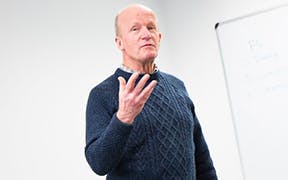
Learn from industry experts
The school regularly organises talks and visits that will provide you with the chance to learn from industry experts with guest masterclasses and visiting authors.
Novelist Jim Crace delivered a series of workshops with students, giving feedback on their work and an insight into the world of professional writing and the publishing industry. Student Nabiyah Saddique said: "It was beneficial to students like me who want to write and be an author by career, to see how his experiences have shaped him and how he has created such beautiful pieces of work from these experiences."
Jim also enjoyed the chance to work with the students: "Everybody tried their hands at pitching an idea, writing the opening paragraphs of a novel, and line editing. It was testing and daunting but nobody fell short. The level of commitment and ability was astounding. London publishers should be beating a path to the School of English; it houses writing talent in abundance."
School of English Blog
A blog that offers you an insight into life as a student at the School of English at Birmingham City University.
Employability
Enhancing employability skills
Employability is embedded across our programme, from sector- and industry-specific skills in creative writing, drama, linguistics and literature, through to transferable skills that hold real value regardless of your employment direction, including literacy and numeracy, time management and organisation, oral and written communication, team work, initiative and enterprise, creative and analytical thinking, self-direction and discipline, independence, information gathering and interpersonal skills.
You will have multiple opportunities to engage in problem solving and problem-based learning, particularly through individual assessments and collaborative practice modules, and to reflect on your own career development needs through participating in the Graduate+ scheme and other employability schemes over the course of your degree.
Placements
The School is committed to developing strong links with employers in Birmingham and the West Midlands. Several language and Creative Writing modules have explicit employer and industry engagement, where you work in collaboration with employer and external partners over the course of the semester and are encouraged to adopt industry-standard practices to facilitate connections and links independently with external partners.
In the case of the Work Placement module, you will have the opportunity to develop skills and abilities in a sector-specific context, while ensuring that academic aims and objectives are met as part of your wider learning journey.
Links to Industry
We regularly seek out opportunities to build further links with partner organisations in the region, including Creative Black Country, Birmingham Literary Festival, Birmingham Museums Trust (including Birmingham Museum and Art Gallery), Black Country Museum Trust, Arvon Creative Writing Foundation, Flatpack Film Festival, West Midlands Screenwriters' Forum, and other Schools within the University, in addition to publishers, charities, third sector organisations, and more, in Birmingham and beyond.
International
Birmingham City University is a vibrant and multicultural university in the heart of a modern and diverse city. We welcome many international students every year – there are currently students from more than 80 countries among our student community.
The University is conveniently placed, with Birmingham International Airport nearby and first-rate transport connections to London and the rest of the UK.
Our international pages contain a wealth of information for international students who are considering applying to study here, including:
- Explore some of the good reasons why you should study here.
- Find out how to improve your language skills before starting your studies.
- Find all the information relevant to applicants from your country.
- Learn where to find financial support for your studies.
International students who have a serious interest in studying with us but who perhaps cannot meet the direct entry requirements, academic or English, or who have been out of education for some time, can enter Birmingham City University International College (BCUIC) and begin their degree studies.
BCUIC is part of the global Navitas Group, an internationally recognised education provider, and the partnership allows students to access the University’s facilities and services and move seamlessly through to achieving a Bachelor’s degree from Birmingham City University.
Facilities & Staff
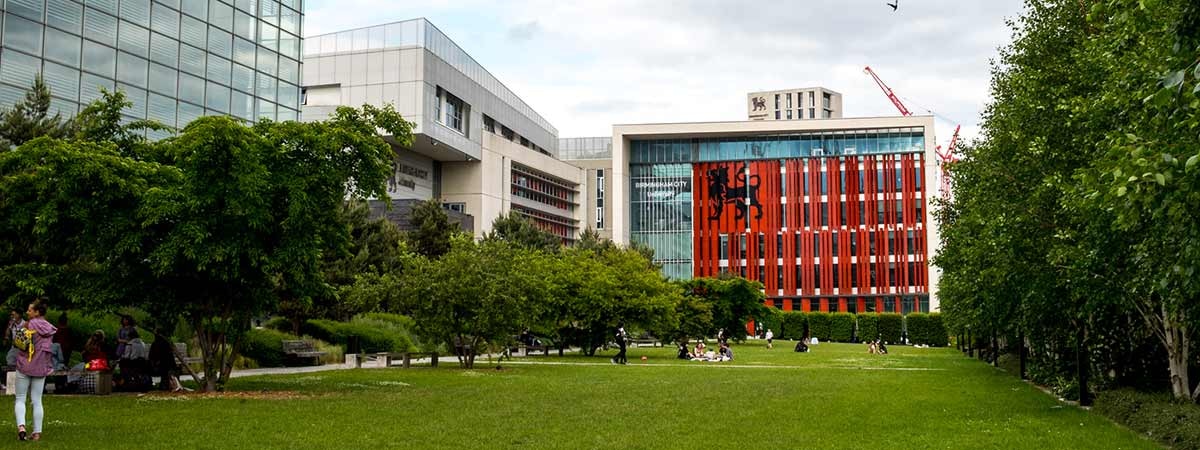
Our Facilities
When you join Birmingham City University, the first thing you will notice is the high standard of our campuses. With an investment of over £400 million across our buildings and facilities, we are committed to giving you the very best learning environment to help shape your experience.
You will study at both the home of the School of English in Millennium Point, and at our £63 million development the Curzon Building, located on our City Centre campus in the vibrant second city that is Birmingham.
Discover your bright and open learning spaces, your 24 hour (during term time) library, drama, media and radio studios, along with state of the art lecture theatres, and a variety of sociable break-out areas, all adding to your unique learning experience.
Our staff
Professor Gregory Leadbetter
Professor of Poetry, Course Director of the MA in Creative Writing, Director of the Institute of Creative and Critical Writing
Gregory Leadbetter is Professor of Poetry at Birmingham City University. His research focuses on Romantic poetry and thought, the traditions to which these relate, and the history and practice of poetry more generally. His book Coleridge and the Daemonic Imagination (Palgrave Macmillan, 2011) won the University English Book Prize 2012. His poetry...
More about GregoryDr Robert Lawson
Associate Professor
Dr Robert Lawson completed his ESRC-funded PhD thesis at the University of Glasgow in 2009, focusing on urban adolescent language use in a high school in Glasgow. Since joining Birmingham City University, Dr Lawson has expanded his focus to encompass research on language in the media, language and masculinities, and the application of...
More about RobertDr Soudabeh Ananisarab
Lecturer in Drama
Before joining BCU, Dr Soudabeh Ananisarab taught at the University of Nottingham where she completed an MA in English Literature (Distinction) and a PhD in English. She currently teaches on a range of modules, exploring drama both in theory and practice.
More about SoudabehAndy Conway
Course Director for BA (Hons) Film and Screenwriting
Andy is a screenwriter and novelist with 30 years’ experience of the writing industry. He has worked as a screenwriter on many films, both produced and lost in development hell, for over 20 years, and ran the Shooting People Screenwriters’ Network for ten years. He also co-founded the West Midlands Screenwriters’ Forum, and the independent...
More about AndyDr Joseph Anderton
Associate Professor of Modern and Contemporary Literature
Joseph Anderton writes and teaches on modern and contemporary literature, particularly in relation to dehumanisation; animals and the environment; homelessness; and literary ethics. He is author of Beckett’s Creatures: Art of Failure after the Holocaust (Bloomsbury, 2016), which considers conceptions of the ‘creature’ and ‘creaturely life’ as...
More about Joseph


